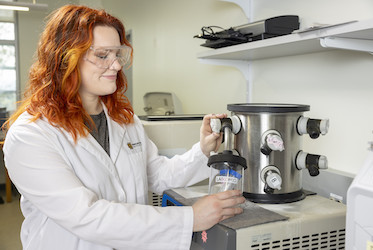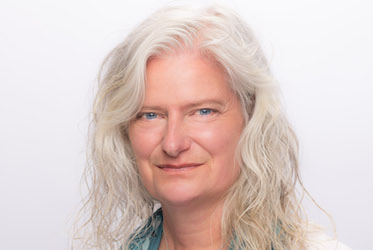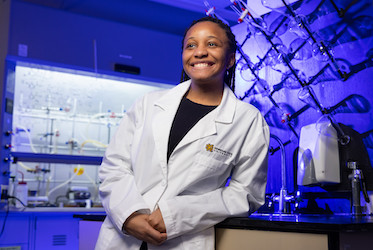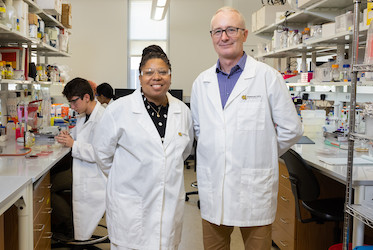
Kennesaw State particle physicists receive grant to improve research processes
KENNESAW, Ga. | Jan 20, 2022
Two Kennesaw State University researchers have been awarded a $300,000 National Science Foundation (NSF) grant to explore improvements in theoretical formalisms and calculations that could advance the study of theoretical particle physics worldwide.

Theoretical particle physics can be a daunting subject in terms of explaining to the public its real-world applications. However, KSU’s Nikolaos Kidonakis and Marco Guzzi said the field has an impact on important areas such as engineering and medicine, including the treatment of cancer.
“Theoretical particle physics is a subfield of physics that deals with the creation of mathematical models to describe and understand fundamental particles and how they interact,” explained Kidonakis, professor of physics. “The object of the work is to have the deepest understanding of nature at its most fundamental level.”

To achieve this goal, Kidonakis and Guzzi develop theoretical models and perform calculations that are used by physicists in particle production experiments conducted in the Large Hadron Collider (LHC), the world’s largest and most powerful particle accelerator. The LHC is located at CERN (European Organization for Nuclear Research) in Geneva, Switzerland.
“The LHC is a huge apparatus, and it has brought a lot of progress in terms of technology, for example,” said Guzzi, assistant professor of theoretical particle physics. “There are many inventions that resulted from the work at CERN even before the LHC, such as the World Wide Web, or even touch screens in smartphones. The LHC provides the potential for even more advancement.”
According to Kidonakis and Guzzi, researchers have used particle accelerators for decades to learn how the nature and interaction of elementary particles can translate into technological applications. One example is the use of the particles in hadron therapy, a process that allows doctors to project a precise beam of protons that can selectively kill cancer cells. These therapies are already in practice around the world.
“Receiving this grant provides us with an invaluable opportunity to both move forward with and expand our existing research,” said Kidonakis, the principal investigator of the project. “Our hope is that it will assist us in answering many of the questions that particle physicists have pondered for many years.”
In terms of the project’s workload, each researcher lends his expertise based on his individual area of interest. For Kidonakis, this pertains to theoretical calculations involving the top quark, which is the heaviest known elementary particle, and the Higgs boson, which is involved in the mechanism for mass generation. For Guzzi, this involves theoretical calculations for new processes to improve our understanding of the structure of the proton and the dynamics of its internal constituents.

“This project is basically a consolidation of our synergistic efforts to establish a strong group of particle theory here at Kennesaw State University,” said Guzzi, who serves as the project’s co-investigator.
While their research can have a global impact, it also has positive results for the University and the region. With the NSF funding, Kidonakis and Guzzi are planning to hire a postdoctoral researcher to assist them in their research. Furthermore, they want to develop a larger theoretical high-energy physics group at KSU, which currently has three faculty members, that would include both students and faculty alike. Finally, they also hope to strengthen physics education and research at KSU and the region, improving STEM education and helping to prepare a workforce that is well-trained in STEM.
“We are the only funded particle theorists in the state of Georgia, and our research has attracted students from other universities and high school science magnet programs,” said Kidonakis. “Thus, this project helps to spread knowledge of fundamental physics to the wider community and to excite young people about the field.”
— Jacob Segura
Photos by Jason Getz
Related Stories
A leader in innovative teaching and learning, Kennesaw State University offers undergraduate, graduate and doctoral degrees to its more than 45,000 students. Kennesaw State is a member of the University System of Georgia with 11 academic colleges. The university’s vibrant campus culture, diverse population, strong global ties and entrepreneurial spirit draw students from throughout the country and the world. Kennesaw State is a Carnegie-designated doctoral research institution (R2), placing it among an elite group of only 7 percent of U.S. colleges and universities with an R1 or R2 status. For more information, visit kennesaw.edu.



















